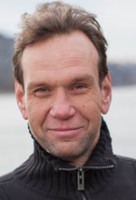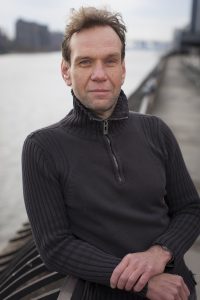Author’s Corner: Sebastian Moll

(Photo by Harry Zernike)
Sebastian Moll is a German-born writer resident in New York City. He reports on New York and the U.S. for a wide range of prestigious German publications including Spiegel online and the Frankfurter Allgemeine. Recently, I caught up with Sebastian for this interview.
1) How did you first become interested in the U.S. generally, and New York City in particular?
Growing up in West Germany in the 1960s and 1970s, there was a very strong American presence, especially in the Frankfurt area, where the European headquarters of the US forces were located. When I was a kid, there were always US military kids that we played with. Along with that presence there was a strong exposure to US pop culture. Listening to American Top 40 on Sunday afternoon on American Forces Radio was a must for us as teenagers. At the same time my parents had a strong affinity to American culture. They were teenagers at the end of the war and like sponges they absorbed the American culture that was suddenly available – Hollywood movies, Jazz, classic and modern American literature. Our living room was filled with it. I am not sure when the fascination with New York began, it probably happened through exposure to various forms of cultural representations of the city.
2) I notice that in Germany, you studied both Germanistik and Amerikanistik. Please tell us something about what you read, saw and discussed in that course of studies.
The young field of American Studies was introduced in German Universities soon after the war as part of the “re-education” effort. In Frankfurt it was divided into history, literature and cultural studies. History was, of course, American history, in literature we studied great American texts from the Puritans all the way to contemporary fiction. Cultural Studies was a little more vague, you could study anything from concepts of American culture to art, film, media or photography. For my Master’s Degree I specialized in contemporary American literature. Later, during my three years as a Ph.D. candidate in Frankfurt, I was more interested in the 19th century: Transcendentalism and Pragmatism in particular. One of my favorite authors from that era was and is Henry Adams. I was also involved in a research project on the history of science in the US that tried to establish a specifically American epistemology that was distinct from the European mode of knowledge production. While I attended NYU for three semesters, I worked with the urban sociologist Richard Sennett. So, as you can see, American Studies prepared me well for being a dilettante in many things.
3) When did you first visit New York City, and what were your impressions of it at the time?
When I was college-age, a friend and I worked for an entire year at the Frankfurt airport to save money to go to New York. We spent two weeks wandering the streets tirelessly and taking it all in. Both of us later returned to New York as journalists, so we had clearly caught the bug. This was New York in the Eighties and it was clearly a very different place than it is now. I think for us kids from well ordered West Germany it represented a kind of freedom heretofore unknown. We were attracted by the diversity and the density of the place of course but also as a place of self re-invention or rather invention – like for so many other immigrants for so many generations. Of course we loved the downtown subculture as a place of radical experimentation for aesthetic, political and social ideas.
4) You write mainly for a German readership; Do you have any funny anecdotes about how Germans have reacted to some of your New York stories?
This is not exactly a reader reaction but one of my favorite anecdotes on how my work was received in Germany. I covered the 2004 presidential election for the Berlin based newspaper taz and the headline the editors put over my article was “Ooops – they did it again.” I suppose that conveyed the essence of my reporting. Generally I try to be a translator between cultures, challenge stereotypes people in Germany have about the United States and paint a nuanced picture. I think that, for the most part, that approach is appreciated.
5) Can you recommend any places in New York City as being authentically German?
I think that the butcher shop Schaller and Weber in Yorkville, a last remnant of the German community there, has as authentic fare as you will find in the US. Also Paulaner on the Bowery, which brews its own beer and makes its own meat products, is a very authentic representation of a contemporary German restaurant – traditional cuisine with a modern twist. And whenever the German soccer team or Bayern Munich plays, you will see young ex-pats congregate there. When I first came to New York German ex-pats would not hang out together. I see it as positive though, that the new generation has a more relaxed attitude about their Germanness, and allow themselves to indulge in a bit of homesickness every now and then.
6) Please tell us about your long-time interest in bicycling.
Didi Thurau, a professional cyclist from Frankfurt, was the leader in the Tour de France in 1977 for 15 days. Those 15 days triggered a huge wave of cycling enthusiasm in Frankfurt, including me, as a 13 year old kid. It’s been my recreational sport of choice ever since, especially since ending my career as a competitive swimmer in college. I was lucky to be able to integrate this passion into my professional life by covering the Tour de France as a reporter between 1999 and 2008. In New York I love exploring the Hudson Valley and the Catskills on long rides with friends. And I have also managed to survive 20 years as bike commuter in the city.
7) Do you have upcoming writing projects that you can tell us about now?
In terms of long term writing projects I am looking for a form to articulate our experience as the first truly postwar German generation whose entire way of being in the world was nonetheless very much shaped by the war. There is a growing literature about the “Kinder der Kriegskinder” – the children of the war-children – and I suppose I am looking for a way to contribute to that in an original and meaningful way.
Sebastian Moll’s website is here.
You can follow Sebastian Moll on Twitter here.
And for a collection of Sebastian Moll’s German-language essays on NYC, go here.
